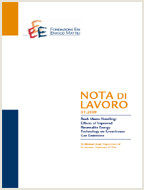Time Overruns as Opportunistic Behavior in Public Procurement

11.10.2012
Chiara D’Alpaos, Michele Moretto, Paola Valbonesi, Sergio Vergalli
D81, H54, H57, L51
Strategic Time Overruns, Public Procurement, Real Options
Economy and Society
Giuseppe Sammarco
This paper considers the supplier’s strategic delivery lead time in a public procurement setting as the result of the firm’s opportunistic behaviour on the optimal investment timing. In the presence of uncertainty on construction costs, we model the supplier’s option to defer the contract’s execution as a Put Option. We include in the model both the discretion of the court of law in enforcing contractual clauses (i.e. a penalty for delays) and the "quality" of the judicial system. Then, we calibrate the model using parameters that mimic the Italian procurement for public works and calculate the maximum amount that a firm is "willing to pay" (per day) to postpone the delivery date and infringe the contract provisions. Our results show that the incentive to delay is greater the higher the construction costs and their volatility, and the weaker the penalty enforcement by the courts of law.
***
Suggested citation: Chiara D’Alpaos, Michele Moretto, Paola Valbonesi, Sergio Vergalli, Time overruns as opportunistic behavior in public procurement, Journal of Economics, September 2013, Volume 110, Issue 1, pp 25-43, http://rd.springer.com/article/10.1007%2Fs00712-013-0352-6
